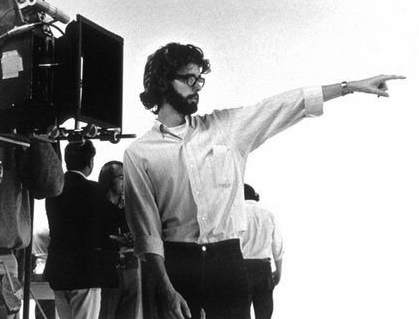As we all know, Star Wars revolutionized merchandising for movies, creating a huge secondary income stream for films that no one could have predicted.
Merchandising had never been successful on that scale before, and now it’s a given that whenever a big potential franchise comes together in Hollywood, well, you’d better have the movie finished on time before the toys are on the shelf.

As reported in Easy Riders, Raging Bulls, when George Lucas was making his Star Wars deal with Fox, he asked for the sequel, merchandising and soundtrack rights, which the studio gave up no problem.
Obviously they lost out on a big bonanza, but as former head of Fox Alan Ladd Jr. told me, “When you’re making that much in film rentals, you’re not unhappy about George filling his coffers with a little more with the merchandising.
“After American Graffiti came out and was such a big hit, George’s agent came to me and said, ‘Look, instead of additional money, I’d rather have a big slice of the merchandise,'” Ladd continues.
“We said fine because merchandising had never been anything before. You may have sold a couple of small sharks or Jaws t-shirts, but merchandising was the farthest thing from anybody’s mind in terms of moneymaking for anybody.”
So how did Lucas know the merchandise would be big money when no one else did? Tom Pollock, who was Lucas’s lawyer, says, “This is my take on it, and it’s only my take… My take is that George’s concern was not with owning all of these things at the time, it wasn’t that he had a giant plan to set himself up as an industry and an empire unto himself, I don’t think that was all planned out.
“His concern was, he did plan to tell nine stories, and he did not want sequel rights ending up in studio development hell where he didn’t have the ability to get the movie made. And that was really the concern. It wasn’t, ‘Oh my God, this gonna be so huge, I’m gonna own it and I can make all the money…’ I don’t think he thought that at all. I think it was more out of fear and distrust of the studios.”
Pollock also adds, “When we made the deal for The Empire Strikes Back, the merchandising rights went to Lucasfilm as of the day of release of Empire, and with Fox getting a royalty for having done the first one.
“So all of the original merchandising deals on the movie were actually made by Fox. If you look on the merchandise of the late 70’s, you’ll see: Copyright and Trademark 20th Century Fox. If you look at the stuff in the 80’s, 90’s and today, you’ll see: Copyright Lucasfilm.”






